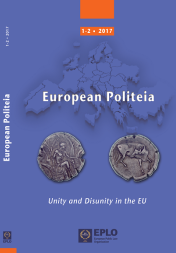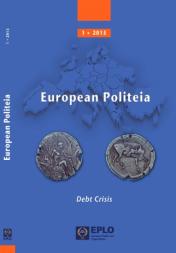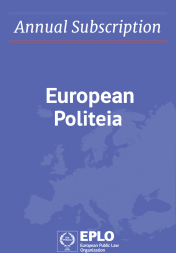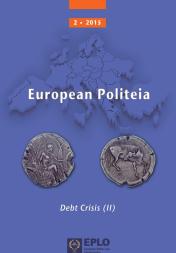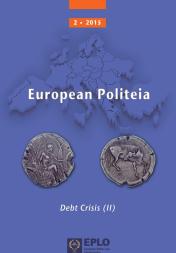
EUROPEAN POLITEIA 1-2/2017
In the Theoria part of this issue, the first article by Dimitris Chryssochoou revisits the concept of ‘organized synarchy’ and argues that Europe has brought about an advanced system of ordered symbiosis among codetermined units which is about a common association retaining its essential character as an ordered plurality. The next article by Kosmas Boskovits deals with Art. 7 TEU and the important institutional dilemmas, notably in terms of unity and disunity in the Europan Union. The article’s main object is to point to the potential of existing judicial procedures in the event of a deadlock of Art. 7 mechanisms. The recent difficulties experienced by the EU at various levels and the various ways in which the Union could act more effectively in the future, with a special attention to an official possibility of differentiated integration of Member States, are dealt with in the third article by Dimitrios Parashu, who however concludes that the Commission’s proposal to this end remains vague and timid in its consequences. The next paper by Antonia-Maria Sarantaki, in trying to answer the question of whether the EU is becoming more united or fragmented while implementing the hotspot approach, analyzes the hotspot model, which was introduced with the European Agenda on Migration and it argues that the hotspot approach as a policy measure provokes fragmentation and therefore disunity among the EU Member States, signalizing a policy paradox. Theodoros Fouskas provides in his article an overview of the situation that the changing influx of asylum seekrs between 2014-2016 in Greece shaped and examines the impact of the “refugee and migration crisis” on the unity of the EU Member States’ societies. In the next article Georgia Kelepouri puts under scrutiny key strands in the ECJ’s case law in the field of national procedural norms and regimes. An overall view of the Court’s stance offers a solid basis for pondering the implications for the process of EU integration and for a thorough understanding of the fresh framework in which the EU judiciary operates. The final article in the section of Theoria by Vera Spyrakou aims to examine the types of the components which integrate European identity, in parallel with the phenomenon of euroskepticism, and to identify practices that foster social participation by improving the prospective for a European “Demos” in order to face the democractic perplexity of European institutions and rethink their multigovernmental functions.
In the Praxis section, Eirini Spanaki deals with the judicial review over the extension of the limitation period in tax cases by specific reference to Judgment no. 1738/2017 of the Plenary Session of the Supreme Administrative Court (Hellenic Council of State), which reflects the most recent case-law development on the question. Panagiota Mourkou comments on the Supreme Administrative Court Judgment 3046/2017 concerning the extradition of applicants for international protection and dealing with the interaction between adminstrative and penal proceedings. Ioannis Livaditis explores the interpretation of Law 4375/2016, by which Directive 2013/32 (Asylum Procedures Directives) was transposed into Greek law, and its compatibility with the Greek Constitution as well as Article 47 of the Charter. Nikos Sekeroglou comments on the Jugdments 2649/2017 and 3312/2017 of the Plenary of the Greek Council of State, which annulled the Joint Ministerial Decisions concerning the obigation of the magistrates to submit statements of financial postion and economic interest.
Under the new section, Theasis, which is launched in this issue of the European Politeia, Evangelos Venizelos addresses the question of democratic legitimacy at national level and solidarity between financially unequal Member States, which both constitute structural problems of the European integration. Next, Apostolos Samaras in his article examines the state of the European integration by shedding light on the anti-EU rhetoric and the rising Far-Right in Europe. The last two articles, written by two experienced and deep-thinking journalists, Yannis Palaiologos and Angelos Athanasopoulos, deal respectively with the European economy and with three main recent events in the EU, that is Brexit, the “neo-nationalistic” foreign policy followed by the Trump Presidency and the debate on the “Future of Europe”.
Prolegomena
Theoria
Dimitris N. Chryssochoou, The Whole and the Parts: The Demands of ‘Unity in Diversity’ [IN ENGLISH]
Dimitrios Parashu, Quocum procedis, Europe? [IN GERMAN]
Antonia-Maria Sarantaki, The Hotspot Paradox: A Fragmented Responsibility-sharing [IN ENGLISH]
Vera Spyrakou, Rethinking the Synthesis in Europe - Political Identity Issue as a Factor of European Integration [IN ENGLISH]
Praxis
Theasis
Apostolos Samaras, Hannibal ad portas? Dismantling Euroscepticism [IN ENGLISH]
Yannis Palaiologos, The European Economy: Back to the Grind [IN ENGLISH]
Angelos Athanasopoulos, EU’s Existential Path toward a Coming of Age [IN ENGLISH]















